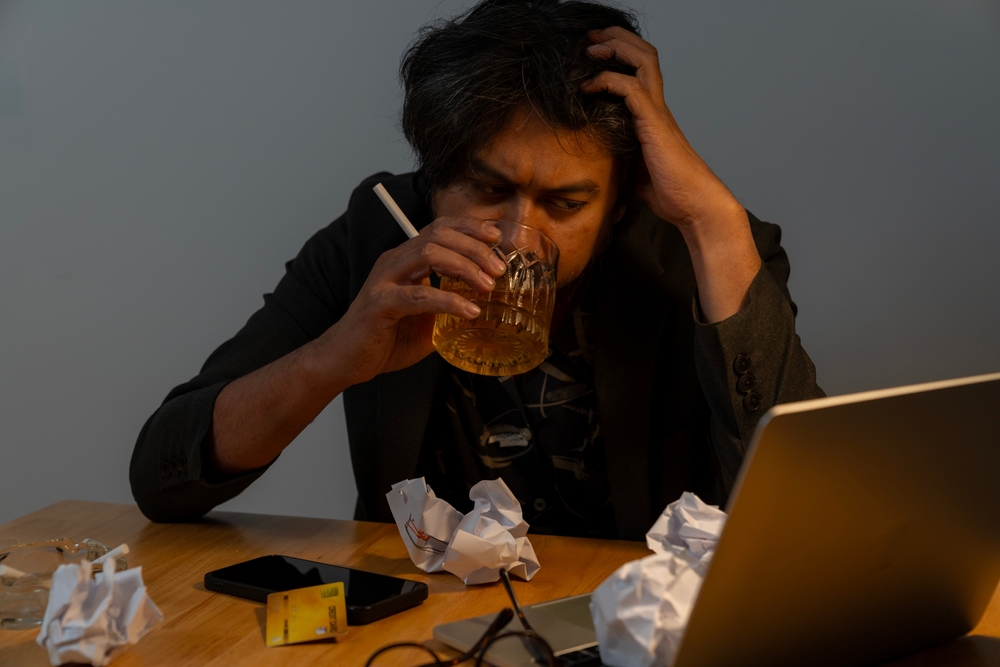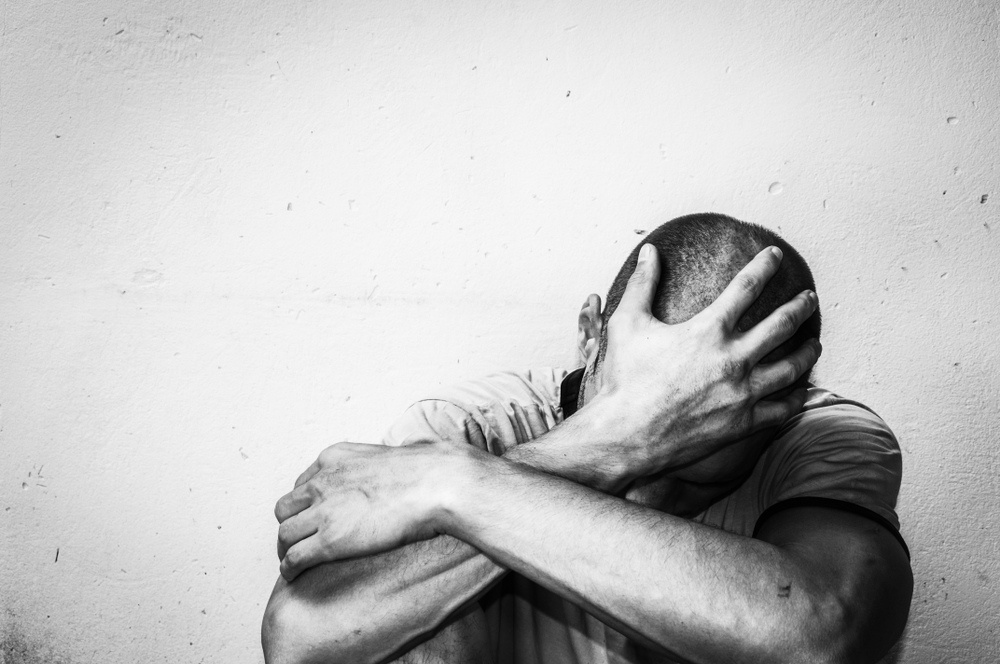Last Updated:
August 7th, 2025
What does an ‘addict’ look like to you?
Take a moment. Picture someone who’s addicted to drugs or alcohol. Better yet, grab a pen. Sketch out a few features or jot down a few words that come to mind.
Now look at what you’ve drawn or written. You might have included some of the following:
- Dishevelled clothing
- Sunken eyes or tired features
- Shaky hands
- Someone slumped in a public space
- Needles or bottles lying nearby
- A face that looks lost, unrecognisable or even threatening
Yes, someone with an addiction could look like this. But addiction doesn’t always leave such obvious marks. In fact, it often hides in plain sight.
Gambling addiction doesn’t come with bloodshot eyes or a shaking voice. It comes with secret bank statements or loans you didn’t know existed. Alcohol addiction in its early stages can show up as a glass of wine that keeps refilling but never runs out. Cocaine addiction might be hidden behind confidence and a strong handshake. There’s no alarm bell or flashing signs that say “I need help.”
When we can’t see something, we tend not to care. That’s where the problem begins.
We only tend to pay attention when it becomes too obvious, like when everything falls apart or when someone close to us suddenly changes. But by then, the question becomes: “Do we now see them as one of those stereotypes we always pictured?” and if so, does that mean they can’t be helped?
It’s easy to spot what we think an addict looks like and pass judgement. It’s much harder to know what the way out looks like. That’s where understanding needs to begin.
In the next section, we take time to analyse a 2018 interview with actor Timothee Chalamet, whose ‘meeting’ with addiction opened a whole new world to him.
Timothée Chalamet meets addiction
Before Call Me By Your Name had made him a household name, Timothée Chalamet was deep in auditions for Beautiful Boy. He was going after the role of Nic Sheff, a real young man whose struggle with meth addiction had been laid bare in two raw and powerful memoirs, one by Nic himself and one by his father, David. It was a role that demanded honesty and a willingness to let go of everything you thought you knew.
Chalamet prepared by immersing himself in the world behind the story. He lost weight. He read the source material. But most importantly, he spoke to people who had lived through addiction. He sat with recovering addicts, listened to what they’d been through and tried to understand what daily life was like during those darkest moments. He even met with Nic Sheff personally. All of it was an attempt to get it right, what addiction looks like and how it makes you act.
Looking back, Chalamet admitted something that many of us might relate to. Before this experience, he had a fixed image in his head of what someone addicted to drugs looked like.
“There was nothing about Nic and meeting him that rubbed me of addiction or whatever my stereotype would’ve been of that at the time,” he said.
Meeting Nic didn’t confirm any of the assumptions, rather, it challenged them.
That moment became the most eye-opening part of the entire process. Addiction doesn’t have a look. It doesn’t favour one type of person, nor does it only appear in people you’d ‘expect’. It’s everywhere. Most importantly, though, it affects people who, on the surface, seem completely fine.
Chalamet reflected, “I think it’s almost easier to be like, ‘Oh, well, that doesn’t affect me or my family or my friends. That’s another thing… when the reality is, it’s everywhere.”
This mindset, that addiction belongs to someone else, is still deeply rooted in how we talk about it. It’s dismissed, trivialised or treated like a distant issue, until it happens to you or someone close. Then it becomes everything.
But words like this remind us we don’t have to wait for it to become personal to take it seriously. All it takes is looking a little closer, listening a little harder and remembering that addiction doesn’t always look the way we expect it to.
Does addiction stigma only affect the person addicted?
When we talk about addiction, the focus usually lands on the person using drugs. But what often goes unnoticed is how the people closest to them, especially family, also become caught in the fallout. According to a range of international studies, families don’t just support a loved one through addiction; they face stigma, isolation and judgement in the process.
Stigma stretches beyond the individual
In multiple studies, families were described as being labelled simply for having a loved one with an addiction. Strangers and even extended social circles often treated them differently. Parents felt judged. Partners experienced blame. And the shame wasn’t imagined — it was confirmed by cold looks, whispered assumptions and social withdrawal from others. In some cases, families started to see themselves differently too, internalising the idea that they had failed in some way.
Social lives shrink to nothing
One of the most reported outcomes was social isolation. Parents, siblings and partners often pulled away from their communities, either because they feared being judged or because invitations and support quietly dried up. They cancelled plans, avoided social spaces and retreated inward. In Australia, families described their new world as one of “self-quarantine” — not forced by illness but by shame.
Asking for help becomes harder
Hiding a family member’s addiction became common. But that secrecy came with a cost. It blocked families from accessing vital support, whether emotional or practical. One study described families as being “cut off from the social world,” unsure of how or where to ask for help and increasingly uncertain that anyone would care if they did.
These studies go to show that stigma and misconceptions about addiction affect the person in question as well as their families, which could seriously hinder the chances of getting the recovery they need.
Where can I find recovery programmes where addiction stigma doesn’t exist?
Addiction recovery at UKAT is rooted in understanding. From the moment you arrive, you’re supported by a team that recognises how stigma can shape a person’s experience and how damaging those misconceptions can be. Many of our staff and peers in recovery know what it’s like to be on the receiving end of harmful labels, which is why UKAT’s rehab environment is designed to be safe and free from the pressure to explain or defend your struggles.
You’ll go through a full programme that includes detox and therapy, helping you stabilise physically while also exploring what led to the addiction in the first place. In therapy, people often reflect on the very same stereotypes they once believed, only to realise they’ve now been affected by them too. It’s in this shared understanding that real recovery starts to grow.
Families, too, are supported. Many have faced blame or silence from their communities. Through family therapy, they can begin to make sense of what’s happened and find healthier ways to move forward together.
If you’re ready for a fresh start, reach out to UKAT today. We’re here to walk with you through recovery, every step of the way.
(Click here to see works cited)
- “Timothée Chalamet in Conversation: A Raw, Honest Talk about Addiction and Recovery.” W Magazine, 17 Jan. 2019, www.wmagazine.com/story/timothee-chalamet-beautiful-boy-addiction-interview.
- Mardani M, Alipour F, Rafiey H, Fallahi-Khoshknab M, Arshi M. Challenges in addiction-affected families: a systematic review of qualitative studies. BMC Psychiatry. 2023 Jun 16;23(1):439. doi: 10.1186/s12888-023-04927-1. PMID: 37328763; PMCID: PMC10273571.





